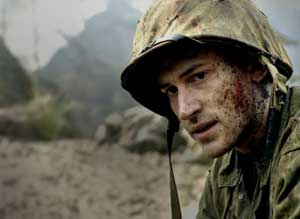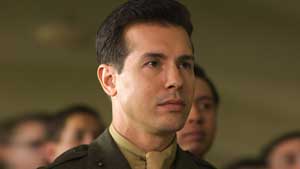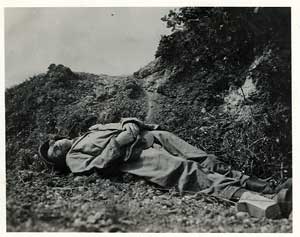Executive producers Tom Hanks, Steven Spielberg and Gary Goetzman did a great job dramatizing the European battles of WWII in 2001's Band of Brothers. Now, nine years later, they've reteamed for another HBO miniseries, to do the same thing for The Pacific -- and it's just as good. Maybe even better...

Part one of the 10-part miniseries premieres Sunday, Mar. 14, at 9 p.m. ET, with subsequent installments premiering on consecutive Sundays. Hanks doesn't appear in it, and Spielberg didn't direct any of it, butmake no mistake: Their attention to detail and demand for quality and authenticity runs through every frame.
Directors and writers for the various hours come from Band of Brothers, but also from The Sopranos, The Wire, John Adams, Six Feet Under and others, a Best-of-Breed group of contributors. Filming took place in Australia, where the locations achieved the key trick of taking a lush, foreign world that looks like paradise and turning it into hell. By comparison, the European theater of operations looks positively civilized.
The drama focuses on three men -- actual Marines, whose stories are meticulously recorded for posterity, by themselves or others. Privates Robert Leckie and Eugene Sledge (played respectively by James Badge Dale and Joe Mazello), wrote memoirs.

John Basilone, who eventually made sergeant (played with aching sensitivity by Jon Seda from Homicide: Life on the Street), became a full-blown war hero, his exploits told far and wide -- often to his annoyance.
I've reviewed The Pacific in detail on NPR's Fresh Air with Terry Gross, and you can read and hear that review by clicking HERE.
What I'd like to do especially for TV WORTH WATCHING, though, is echo how the impetus for this companion miniseries -- basically, a series of complaints by veterans of the Pacific conflict who felt their contributions were overlooked and misunderstood -- can be traced to WWII itself.
Ernie Pyle, arguably that war's most famous and respected print reporter, had reported from North Africa and Normandy, from Italy and Germany. Like Band of Brothers and Spielberg's Saving Private Ryan decades later, his accounts as a war correspondent focused on soldiers, not officers, and witnessed the bloody battles from gory, ghastly ground level. He was a beloved figure among the fighting men -- but in the Pacific, Pyle began getting complaints that he was overlooking their side of the story.
"Now hear this, Ernie, we're not bitching, nor are we bitter," wrote one soldier. "But come, come, Ernie, how about visiting us sometime, and enjoying our rats' eye view of this Pacific paradise?" Another wrote Pyle that "six or 16 or 26 months on an island like Saipan or smaller than Saipan does something funny to you."

Pyle took the criticisms seriously, arrived in the Pacific in time to report from Iwo Jima in 1945, and, on a small island called Ie Shima, died there from sniper fire. Fittingly, and poignantly, a war photographer took a picture of Pyle's body as soon as it was safe to do so -- capturing, for all time, how the premier war reporter died on duty. (The grim picture is shown here.)
But months before that, according to James Tobin's excellent Ernie Pyle's War, Pyle had gotten a grateful letter from General Dwight D. Eisenhower, thanking Pyle for the honesty and realism of the war reporting in his book Brave Men. Pyle responded with humility, and with a sense that print accounts of war could go only so far.
"I've found," Pyle told the future President of the United States, "that no matter how much we talk, or write, or show pictures, people who have not actually been in war are incapable of having any real conception of it....
"As you know, I've spent two and a half years carrying the torch for the foot soldier, and I think I have helped make America conscious of, and sympathetic toward him, but haven't made them feel what he goes through. I believe it's impossible."
And I believe, through the you-are-there realism and overwhelming horridness depicted in such works as Saving Private Ryan, Band of Brothers and now The Pacific, the impossible has been made possible.
These works not only are demands for respect and gratitude for what we, as a country, asked these young men (and, sometimes, young women) to try to endure. They are, in their way, pleas for peace.
Do not miss The Pacific.